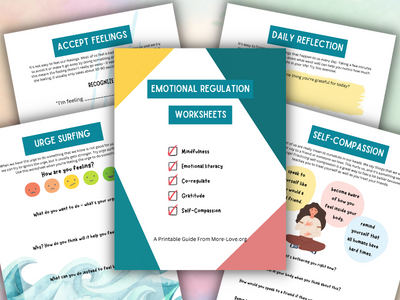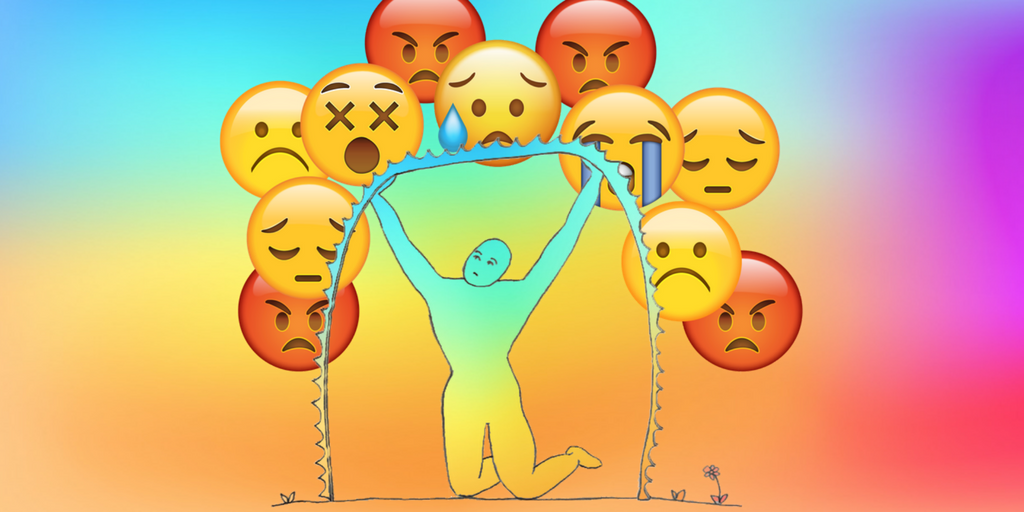
A guide for parents about mental health and eating disorders
Your child’s mental health can be both a cause and a symptom of their eating disorder. Psychology is interwoven with biological and social causes of eating disorders.
Some mental health conditions are present before the eating disorder arises, while others will come up in response to the eating disorder. For example, anxiety commonly precedes an eating disorder and anxiety often gets worse with an eating disorder.
Skillful support begins with understanding what’s going on, and diving into the psychology of eating disorders can give you insight into some of what might be going on inside your child’s mind.
Parent-Friendly ❤️ Neurobiology ❤️ Attachment ❤️ Non-Diet ❤️ Health At Every Size®
Our unique psychology is how we mentally adapt, respond, and cope with our biology, social, and environmental conditions. Let’s start by taking a look at why and how we build psychological coping methods.
Highly Sensitive

Most people with eating disorders fit the description of being “highly sensitive.” This is a biological condition that affects about 30% of all people. Highly sensitive people are much more sensitive to their five senses and “neuroception” or the sensation of felt safety with other people and in the environment. They are also more sensitive to “interoception,” internal experiences like hunger, fullness, nausea, etc. Highly sensitive people have a more reactive cortisol system and flight-fight-freeze response system. This biological sensitivity can lead to big emotional reactions to seemingly small events.
Emotional Regulation

All of us seek a state of emotional regulation in which our body and mind are calm, engaged, and in balance. But when our nervous system perceives a threat, it signals our amygdala, which raises cortisol levels and triggers the flight, fight, or freeze response. We become either dysregulated (highly-reactive) or disengaged (under-active). People in a dysregulated state have symptoms of anxiety, while those in a disengaged state have symptoms of depression. These symptoms drive a cascade of physical and psychological responses. They have a significant impact on the digestive system in particular.
Coping Skills

Our bodies are wired to return to a state of emotional regulation as quickly as possible. To do this we develop psychological coping skills. For example, if your body gets cold, your psychological coping skill is to reach for a sweater. Psychological coping skills are morally neutral, however, there are skills that are healthy and effective and others that are less so. For example, maybe instead of grabbing a sweater, you quit your job, leave your family, and move to a tropical climate. That solves the problem of being cold, but it may be an overreaction.
Eating disorders develop as a way to regulate the system. They may seem as extreme as dropping everything and moving to a warmer climate, but they also work – at least in the short term. For example, if you’re dysregulated and your appetite and digestion are completely shut down, you may cope by avoiding food. If you’re dysregulated because you’ve been restricting food and you’re starving, your natural coping response may be to eat a lot of calorie-dense food as fast as possible.
Most psychological coping skills operate beneath the level of consciousness. They feel more driven than considered, more of an impulse than a decision. This is why eating disorders are so hard to treat – they are both unconscious and they are working on some level to make the person feel better. Someone with an eating disorder is trying to help themselves feel better. That’s why treatment must include building emotional regulation skills and developing new ways of coping with physical and emotional distress.
Mental Disorders
A highly sensitive person is frequently living in a state of emotional dysregulation. Unless they have been taught healthy and adaptive coping skills, they will naturally develop other ways to cope with their distress. To the person on the outside, these psychological coping methods can seem like an overreaction. But make no mistake: they work in some way, or they wouldn’t be there.
Mental disorders don’t come out of nowhere. They are built out of a complicated interaction of biology, psychology, and social forces. When we bring this level of understanding to eating disorder treatment we are both more compassionate and more effective in treating the eating disorder. Because the only way to heal from an eating disorder is to replace it with healthier ways of coping with distress.
It is brutally difficult to let go of an eating disorder that has, on some level, been serving an important purpose. That’s why it takes time, patience, and tenacity to support someone who is recovering.
Usually a person in great distress has more than one coping method. This is why eating disorders often show up with other mental disorders. These disorders may come before the eating disorder, or they can show up alongside or as a symptom of the eating disorder. Either way, skillful treatment recognizes the common need, which is to manage distress and return the person to a state of emotional regulation. Here are the mental disorders that often show up with eating disorders.
Anxiety Disorders

The most common underlying and co-occurring factor in eating disorders is anxiety. In a study of people with eating disorders, 65% also met the criteria for an anxiety disorder. In more than half of those cases, the anxiety disorder preceded the eating disorder. There are very high rates of social anxiety in particular in people with eating disorders. Almost 85% of people with bulimia have social anxiety, while 75% of people with other eating disorders have social anxiety.
Depression

More than half of people with eating disorders also have depression. In one neurological study, brain scans revealed that disordered eating behaviors and depressive symptoms developed together. Researchers were accurately able to predict the development of purging in particular alongside brain-based symptoms of depression. Meanwhile, food restriction and fear of weight gain in people with anorexia predicts more depressive symptoms.
Obsessive Compulsive Disorder (OCD)

A research study in 2004 found that up to 41% of people with eating disorders have OCD. The symptoms of OCD tend to worsen as an eating disorder progresses, suggesting a self-reinforcing cycle between the two. There are many similarities between OCD and eating disorders. Specifically, cognitive rigidity, obsessiveness, detail focus, perfectionism and compulsive routines have long been reported as both causes and symptoms for both disorders.
Trauma And PTSD

Many individuals with eating disorders report past traumatic experiences and symptoms of full PTSD. Up to 32% of people with bulimia and binge eating disorder and up to 23% of people with anorexia also have PTSD. Overlapping symptoms include self-criticism, low self-worth, guilt, shame, depression, anxiety, emotion dysregulation, anger and impulsivity. It has been suggested that eating disorders may serve a functional role to help a person avoid the distress of their trauma.
Suicidal Ideation/Self-Harm

Among teens with eating disorders, 65% reported suicidal ideation within the past 6 months and 25% had attempted suicide at some point in the past. Eating disorders are a significant risk factor for suicide, and there is a genetic association between the two. Non-suicidal self-harming behavior such as banging and cutting is found in up to one-third of people with eating disorders. At 49% and 41% respectively, rates of self-harm are highest for people with OSFED and bulimia.
Neurological Disorders
Additionally, we need to mention ADHD and autism, which are neurological disorders that are also classified as mental health disorders. These are not coping methods but brain-based conditions that are associated with high sensitivity and low emotional regulation. They can be the foundation for an eating disorder and their symptoms must be managed for eating disorder recovery to stick.
Attention Deficit Hyperactivity Disorder (ADHD)

People with ADHD are more likely to develop eating disorders than the general population. One study found that 31% of adults diagnosed with eating disorders also had ADHD. This is much higher than the general population, of which 3-10% of people have ADHD. About 36% of people who have bulimia and anorexia with a bingeing/purging subtype and 18% of people with anorexia have ADHD. Eating disorders have been described both as a symptom of the impulsivity of ADHD and/or a coping mechanism for the emotional dysregulation that is common with ADHD.
Autism

Between 20-30% of people with eating disorders also have autism or signs of autism. Autism is especially correlated with ARFID (Avoidant Restrictive Food Intake Disorder). There is even a hypothesis that under-diagnosis and subsequent lack of treatment for autism may mean that many girls diagnosed with anorexia have a primary condition of autism. Atypical eating behaviors, including limited food preferences and hypersensitivity to texture are found in 70.4% of children with autism. Eating disorders have been described as both a symptom of the high sensitivity of autism and/or a coping mechanism for the emotional dysregulation that is common with autism.
Mental Health Checklist
Eating disorders are often layered on top of other mental health conditions, thus treatment must address mental health. This mental health checklist for eating disorder recovery outlines the behaviors that support mental health as well as warning signs that your child needs more support. Free Download
Emotional Regulation Worksheets
Give these printable worksheets to grow more confident, calm and resilient and feel better, fast!
- Self-Esteem
- Self-Regulation
- Mindfulness
- Calming strategies
< More About The Causes Of Eating Disorders
Popular Articles About Mental Health And Eating Disorders
ADHD, ASD, OCD and PTSD
In many cases, eating disorder behaviors are a sort of secondary condition that lies on top of other disorders. It’s possible that your child’s disorder goes much deeper than food, eating, and weight, and includes an underlying condition.
free cheat sheet: Parenting A Child With An Eating Disorder
⭐ Get ready for recovery and find out how you can prepare yourself for maximum success.
⭐ Find out the essential steps and family rules you need to have in place for recovery.
⭐ Make your home recovery-ready with six simple steps that anyone can do.













